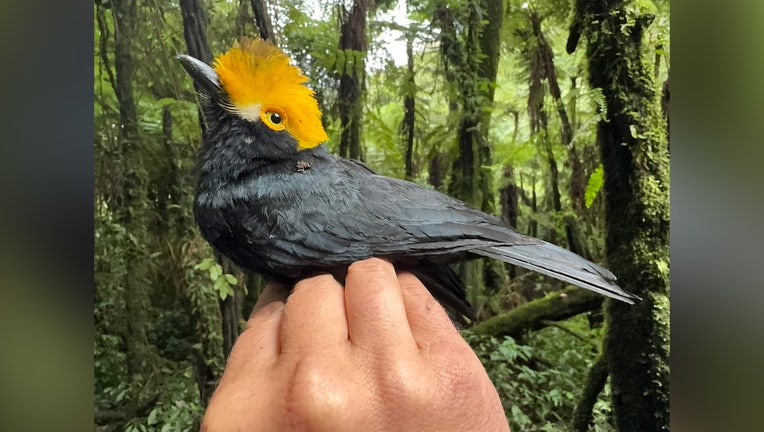Scientists photograph ‘lost bird,’ not seen for decades, during expedition in Africa

The first-ever photograph of the yellow-crested helmetshrike, or Prionops alberti, was taken during a recent expedition led by scientists at The University of Texas at El Paso.
KINSHASA, Congo - The yellow-crested helmetshrike is a species of bird categorized as a "lost bird" by the American Bird Conservancy, having not been spotted in the wild in nearly two decades, until now.
During a six-week expedition that ran from December 2023 to January 2024, deep in the mountains of the Republic of the Congo, researchers from the University of Texas at El Paso (UTEP) found the bird and were able to capture the first recorded photos of the bird since it was considered lost.
Michael Harvey, Ph.D, an ornithologist at UTEP, photographed the bird.
"It was a mind-blowing experience to come across these birds. We knew they might be possible here, but I was not prepared for how spectacular and unique they would appear in life," Harvey said.
Harvey co-led the expedition with Eli Greenbaum, Ph.D., a UTEP professor of biological sciences.
Their team journeyed over 75 miles on foot through the Itombwe Massif, a range of mountains located in the eastern part of the Democratic Republic of Congo in Central Africa.
It’s known for its rugged terrain with peaks reaching over 9,800 feet. It is also home to a wide variety of plant and animal species, some found nowhere else on Earth.
According to a press release from UTEP, the team stumbled across the bird on the slopes of a mountain. There, 18 total helmetshrikes were found.
Harvey said the discovery brought solace to the team who feared for the species’ health.
"This inspires hope that perhaps the species still has a reasonably healthy population in the remote forests of the region," Harvey said. "But mining and logging as well as the clearing of forests for agriculture are making inroads deep into the forests of the Itombwe range. We are in discussions with other researchers and conservation organizations to further efforts to protect the region’s forests and the helmetshrike."
This story was reported from Los Angeles.

